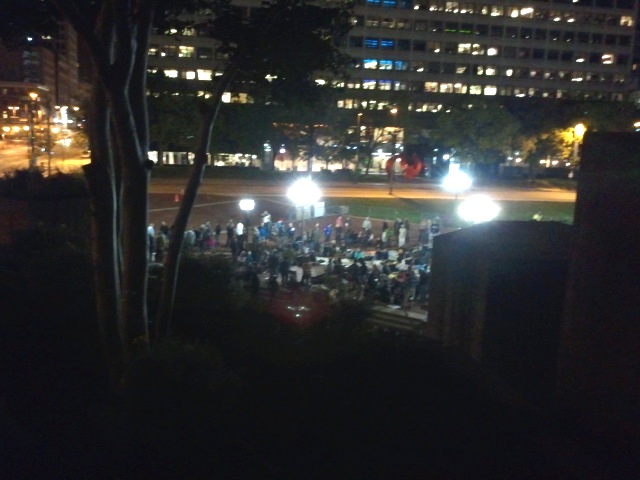Live blogging from the Occupy Wall Street site, Liberty Plaza, New York City
I came down for an hour or so yesterday, just to see what was what. Danced to the drumming for a bit, and the playful and gentle nature of some of what's happening here (drumming, dancing, art, communal sacred space, giant potluck meals) reminded me of some of Kery Thornley's "yin revolution" and "counter-games" ideas in his book Zenarchy. The Occupy movement is not just a protest, but an experiment and a demonstration of an alternative to the hierarchical socioeconomic systems that have dominated our thinking for centuries.
I also ended up running into someone I knew years ago in Baltimore and fell into good conversation with her and with a high school girl she had befrended. Just hearing people's stories is also a big piece of what this is about, for as John Steinbeck wrote, "two men [or women] are not as lonely and perplexed as one".
Came down again this afternoon after my plan to visit the Statue of Liberty was derailed by a security snafu. (Apparently the US Park Service fears that I will use the awesome power of my Gerber multi-tool to disassemble the Statue of Liberty. There is, of course, no irony at all in the paranoia of the security state preventing me from visiting the Statue of Liberty. I gave up my ticket rather than have them take the $60 tool.) Ran into a few more Baltimore people (between OWS, and running into a woman who used to date one of my best friends in the Village last night, seems I can't even escape into anonymity in New York), and got into more interesting conversations with strangers, but spent most of today's time here just sitting at the community altar, holding space. (Photos to come.)
It's interesting how people react to the barriers the police have put up around the site. They don't completely enclose the space, you can move in and out freely, yet many people come up and stand on the other side watching, as if watching a parade or something. Perhaps a deliberate bit of police strategy to keep people from feeling like they can join or identify with the occupation -- establishing a boundary that takes a deliberate act to step across.
So I invite you to cross it. Go down to your local Occupy group and join them, even for an hour. Cross the lines that the power structure sets up to keep us divided.
